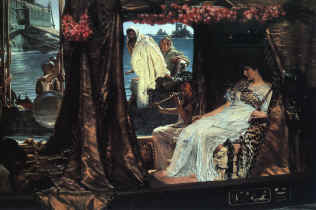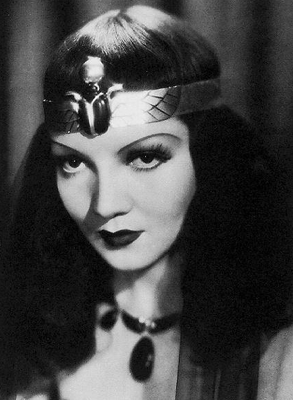
ACT II
SCENE i
Pompey speaks with his cronies about their challenge to the triumvirate, insisting that the gods are on his side. Menecrates tries to be philosophical:
We, ignorant of ourselves,But Pompey is confident. "The people love me, and the sea is mine" (II.i.9). He is glad that "Mark Antony / In Egypt sits at dinner, and will make / No wars without-doors" (II.i.11-13), and he considers Caesar an upstart, losing affection and loyalty for monetary tribute. Lepidus is a waste of space. Pompey hopes that Cleopatra will "Tie up the libertine in a field of feasts, / Keep his brain fuming" (II.i.23f). But news arrives that Antony is due any moment back in Rome. At least, Pompey can rationalize, the threat he himself poses must be significant enough to "pluck" Antony from "the lap of Egypt's widow" (II.i.37). Menas reassures Pompey that Caesar and Antony are probably antagonistic towards each other, but Pompey worries that they might patch up their differences in light of the greater danger.
Beg often our own harms, which the wise pow'rs
Deny us for our good; so we find profit
By losing of our prayers. (II.i.5-8)
SCENE ii
Lepidus hopes Antony will act reverently to Caesar but Enobarbus insists Antony will not demean himself and will exert an appropriate defiance. Caesar enters with his officers Maecenas and Agrippa, and Lepidus continues trying to smooth matters over: "When we debate / Our trivial difference loud, we do commit / Murther in healing wounds" (I.ii.20-22) -- a medical analogy for the occasion and possibly a Shakespearean international critique.
All is tense and political between Antony and Caesar, even the etiquette of sitting down (II.ii.27f). Antony half-broaches the subject: "I learn you take things ill which are not so -- / Or being, concern you not" (II.ii.29-30). Caesar thinks it laughable that he should care about Antony's life in Egypt, unless Antony "Did practice on my state" (II.ii.39), that is, plot against him. Caesar is a hypocrite, as all this is not what he was kvetching with Lepidus about earlier. And he's bitchy about the wars made upon him by Antony's wife and brother. Antony insists that had nothing to do with him -- on the contrary, part of the motivation was to get him back from Egypt (II.ii.95).
This scene of bickering egos has been called a clash between the power of personality and the impersonality of power (Goddard, II 185). Caesar trusts no one, which makes him politically successful; he's inherited the canniness but not the generosity of his uncle and adoptive father, Julius Caesar.
Caesar is additionally pissed that Antony didn't supply troops when requested: Caesar says Antony denied them; Antony says neglected to send (II.ii.89). Both Lepidus and Enobarbus recommend that they suspend their petty grievances in light of the matter at hand, but Antony tells Enobarbus (again) to shut up.
Agrippa pipes in with a plan: what if Antony, now that he's a widower, were to marry Caesar's sister Octavia? Caesar makes a snide comment about Cleopatra's potential reaction to such a plan, prompting Antony to assert his independence: "I am not married, Caesar" (II.ii.122). After a lengthy explanation of the advantages of this plan, Agrippa adds, "Pardon what I have spoke, / For 'tis a studied, not a present thought, / By duty ruminated" (II.ii.136-138) -- an indication that this has been a set-up, arranged ahead of time by Caesar to see Antony's reaction. It works; Antony is agreeable. Caesar magnanimously states, "A sister I bequeath you, whom no brother / Did ever love so dearly" (II.ii.149-150), but although he objects to the idea of Antony's giving up a kingdom for a "whore," he's willing to fork over a sister for an empire (Goddard, II 186).
| Antony remarks that Pompey is not really his enemy, so perhaps some diplomacy will work. The triumvirs retire, matters having been "well disgested" (II.ii.176). The three officers remain behind: Enobarbus, Maecenas, and Agrippa, the latter two asking Enobarbus about the luxurious life in Egypt. The description scene of Cleopatra's barge is taken very directly from Plutarch (or the translation). Enobarbus also recounts the meeting of Antony and Cleopatra, involving the politics of food -- who would come to whose supper. The blur between Cleopatra and her land emerges in a crude assertion by Agrippa: "She made great Caesar lay his sword to bed; / He ploughed her, and she cropp'd" (II.ii.226-227). But Enobarbus speaks of her enchanting qualities. Maecenas notes that "Now Antony / Must leave her utterly" (II.ii.232f), and we worry about Enobarbus' diplomacy; perhaps his camaraderie goes too far in his predicting that Antony will not leave Cleopatra: "Age cannot wither her, nor custom stale / Her infinite variety" (II.ii.234-235) -- a quotation paraphrased by Sherlock Holmes, I forget in what context. |

|
SCENE iii
With Caesar chaperoning, Antony tells Octavia not to worry about his obligatory absences nor his checkered past, that he'll be true. But after a soothsayer tells Antony that Caesar's fortunes are better and that Antony's character withers in the presence of Caesar, an indication that he's trying to align himself in the wrong world, Antony "will to Egypt; / And though I make this marriage for my peace, / I' th' East my pleasure lies" (II.iii.39-41).
SCENE iv
Lepidus and the officers prepare for possible battle.
SCENE v
Cleopatra, inspired by the opening lines of Twelfth Night, calls, "Give me some music; music, moody food / Of us that trade in love" (II.v.1-2). She languishes, recalling with Charmian a fishing trick she played on Antony and another time when they cross-dressed. (One explanation of this reference makes it an allusion to them playing Hercules and Omphale, where she enslaved him with charms and made him wear her clothes as she strutted about wearing Hercules' sword.)

|
A messenger brings news of Antony, sending Cleopatra into histrionics
again: "Antonio's dead!" (II.v.26). After Cleopatra's microscopic
examination of any available nuances, the messenger is finally able to
report that Antony married Octavia, Cleopatra interestingly says, "I am
pale,
Charmian" (II.v.59), as if she is part of her own observing audience. She
pitches a fit and slaps the messenger about, even drawing a knife on him.
"Melt Egypt into Nile! and kindly creatures / Turn all to serpents!"
(II.v.78-79). But she realizes she went too far and calls back the
terrified messenger. Although distraught, she seems to have the
resourcefulness to have her ladies grill the messenger for info about
Antony's new wife: "the feature of Octavia, her years, / Her inclination;
... / The color of her hair" (II.v.112-114).
Supposedly, a later scene (III.iii) closely resembles one at the Elizabethan royal court. The Memoirs of Sir James Melville, not published until 1683, records incidents occurring in 1564 between this emissary of Mary, Queen of Scots and the English Queen: "He describes in detail Queen Elizabeth's anxious inquiries about the appearance and accomplishments of her dreaded rival" (Morris 272; cf. Rinehart 82f). Cleopatra strikes the messenger who brings the news of Antony's marriage to Octavia; "the Folio directs that Cleopatra 'Strikes him down,' 'Strikes him,' and 'She hales him up and downe.'" And for these aspects of her character, too, Shakespeare had not far to look for a model. His own queen, brilliant and captivating, was yet capable of undignified spurts of rage, hysterical nerve storms, and public flirtation" (Morris 275). Ambassadors such as the Spanish Mendoza and other witnesses continually refer to her tantrums (see Morris 275-276). |
SCENE vi
Pompey meets with the triumvirate and a deal has already been proposed (II.vi.4, 34). Pompey is terse with Caesar, but after some camaraderie with Antony he accepts the offer and invites them all to feast on his galley to celebrate the treaty. Enobarbus amuses Pompey with his brash wit, and then speaks with Menas, again, one is apt to think, going too far in predicting openly that the Octavia marriage won't work and Antony will return to Cleopatra, his "Egyptian dish" (II.vi.126).
SCENE vii
Two or three servants comment on the spectacle of drunken generals and officers taking place. Goddard insists there should be three servants to clash an admirable trio with the embarrassing triumvirate (188). One servant says that having a great name is a burden he would not want.
Meanwhile, Antony is yammering with travelogue material, political buffer Lepidus is reduced to a soused fool, and Caesar makes a nasty and puritanical drunk. Menas calls Pompey aside, telling him that they could cut the cable and drift to sea, and then slit the throats of the triumvirs. Pompey's odd reaction is that Menas should have just done it instead of asking him -- now he must condemn such an assassination plot. "Here Shakespeare is plainly paying his compliments to the fatuousness of a humanity that can delegate all its power to three drunken men on a boat--let its destiny depend on the slender string of a galley's cable and the still slenderer string of one man's 'honour'" (Goddard, II 189).
The sots sing a hymn to Bacchus. Stick-in-the-mud Caesar leaves the party saying, "our graver business / Frowns at this levity" (II.vii.120-121), and the party breaks up.